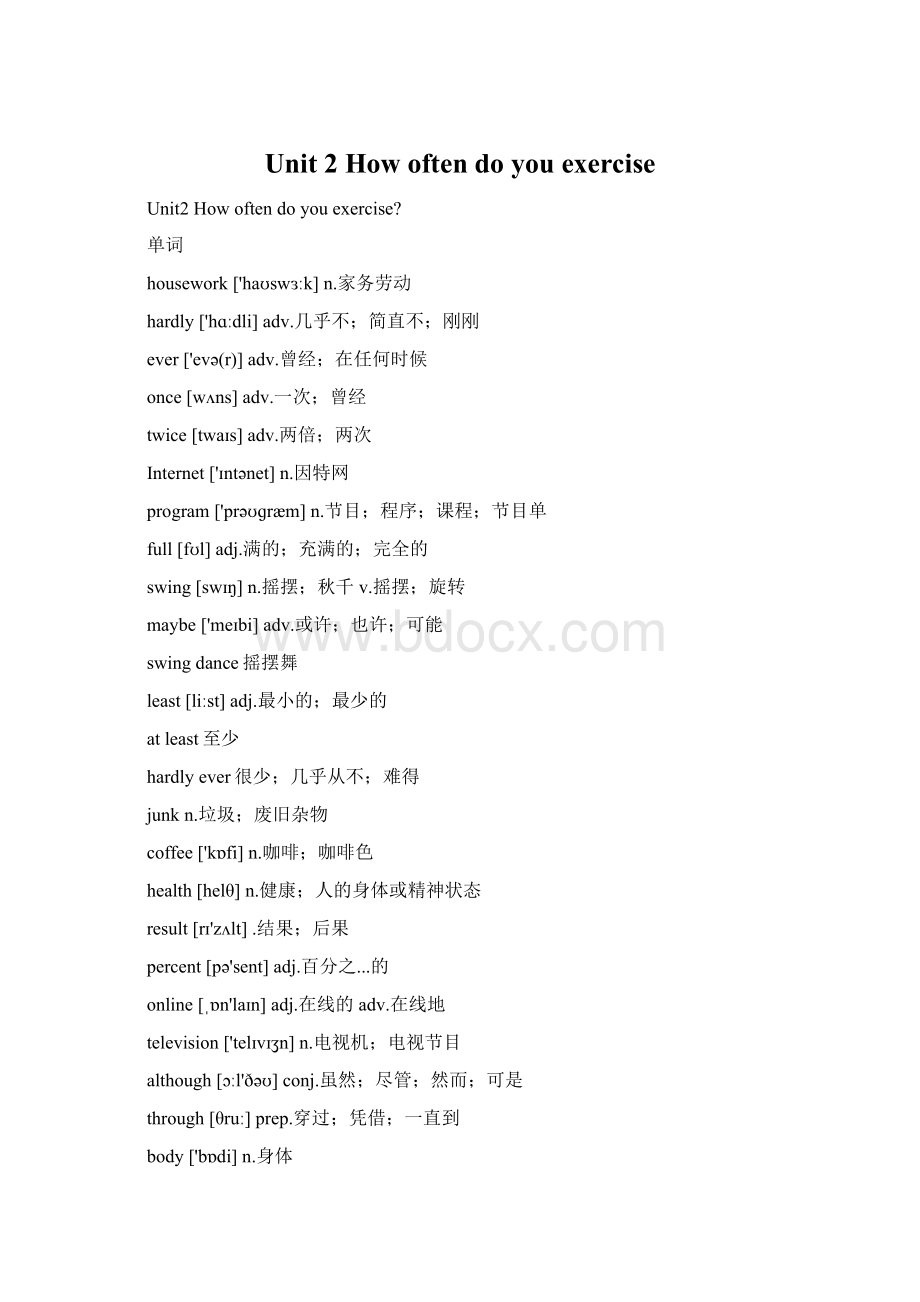Unit 2How often do you exerciseWord文档格式.docx
《Unit 2How often do you exerciseWord文档格式.docx》由会员分享,可在线阅读,更多相关《Unit 2How often do you exerciseWord文档格式.docx(12页珍藏版)》请在冰豆网上搜索。

然而;
可是
through[θruː]prep.穿过;
凭借;
一直到
body['
bɒdi]n.身体
mind[maɪnd].头脑;
想法;
意见;
心思
such[sʌtʃ]adj.这样的;
如此的
together[tə'
ɡeð
ə(r)]adv.共同;
一起
die[daɪ]v.死;
枯竭;
消失
writer['
raɪtə(r)]n.作者;
作家
dentist['
dentɪst]n.牙科医生
magazine['
mæ
ɡəziːn]n.杂志
however[haʊ'
evə(r)]adv.然而;
无论如何;
不管多么
than[ð
ən]conj.比
almost['
ɔːlməʊst]adv.几乎;
差不多
none[nʌn]pron.没有人;
没有任何东西,毫无
less[les]adj.更少的;
较少的
point[pɔɪnt]n.看法;
要点;
重点;
小数点;
目标;
分数
重点短语
suchas例如;
诸如
junkfoodn.垃圾食品;
无营养食品
morethan超过;
多于;
不仅仅;
非常
lessthan不到;
少于
helpwithhousework帮助做家务onweekends在周末
howoften多久一次hardlyever几乎从不
onceaweek每周一次twiceamonth每月两次
veryday每天befree有空
gotothemovies去看电影usetheInternet用互联网
swingdance摇摆舞playtennis打网球
stayuplate熬夜;
睡得很晚atleast至少
havedanceandpianolessons上舞蹈课和钢琴课
gotobedearly早点睡觉
playsports进行体育活动begoodfor对……有好处
gocamping去野营not…atall一点儿也不……
inone’sfreetime在某人的业余时间
themostpopular最受欢迎的
suchas比如;
诸如oldhabitsdiehard积习难改
gotothedentist去看牙医mornthan多于;
超过
lessthan少于helpsb.withsth.帮助某人做某事
Howabout…?
......怎么样?
wantsb.todosth.想让某人做某事
Howmany+可数名词复数+一般疑问句?
……有多少……?
spendtimewithsb.和某人一起度过时光
It’s+adj.+todosth.做某事的……的。
asksb.aboutsth.向某人询问某事
bydoingsth.通过做某事
What’syourfavorite……?
你最喜爱的……是什么?
thebestwaytodosth.做某事的最好方式
三.重点语法
(一)重点句型
1.-----Whatdoyouusuallydoonweekends?
-----Ioftengotothemovies.
(1)onweekends/ontheweekend在周末
(2)gotothemovies去看电影
(3)第一个do助动词第二个do实意动词
2.hardlyever几乎从不hardlyever相当于hardly,ever起强调作用。
hardly为副词,意为“几乎不,没有)”,相当于almostnot,本身具有否定含义,不能再使用其他否定词。
E.g.Shehardlyeatsanything.
辨析:
hardly和hardhard作形容词,意为“困难的,艰硬的”;
hard作副词,意为“努力地,猛烈地”。
hardly意为“几乎不”
(1)Thegroundistootodig
(2)Icanunderstandthem.
(3)It'
sraining,thepeoplecangooutside.
3.----HowoftendoyouwatchTV?
----Twiceaweek.
(1)howoften意为“多久一次,多长时间一次”,用来提问频率。
(2)twiceaweek一周两次
拓展:
一次once两次twice
三次或三次以上基数词+timesthreetimesfourtimes
4.What'
syourfavoriteprogram?
=Whatprogramdoyoulikebest?
你最喜欢的节目是什么?
5.Howcome?
怎么回事?
怎么会?
表示某件事情很奇怪,有点想不通;
可单独使用,也可引导一个问句。
相当于疑问词why。
但howcome开头的特殊疑问句使用的仍是陈述语序。
Howcomeyoudidn'
ttellmeaboutit?
=Whyyoudidn'
6.Igotothemoviesmaybeonceamonth.我也许一个月去看一次电影。
maybe副词,意为“或许,大概,可能”,常位于句首。
E.g.Maybeheknowsthewaytothepark.
辨析:
maybe与maybemaybe副词,作状语,意为“或许,大概,可能”,常位于句首。
maybe属于“情态动词+be动词”结构,意为“可能是”。
(1)Thebabyiscrying_______sheishungry.
(2)Thewoman______ateacher.
7.Lastmonthweaskedourstudentsabouttheirfreetimeactivities.
askab.aboutsth.询问某人某事
8.Weallknowthatmanystudentsoftengoonline,butweweresurprisedthatninetypercentofthemusetheInterneteveryday.Theothertenpercentuseitatleastthreeorfourtimesaweek.我们都知道许多学生经常上网,但是让我们感到惊讶的是90%的学生每天都上网,而另外10%的学生一周至少上网达三至四次。
(1)other:
adj.其他的+名词
theother:
adj.其他的+名词(在特定的范围内)
one„theother„一个„„另一个
E.g.Oneofthemisblue,theotheronesarepurple.
它们的其中一个是蓝色的,其他的是紫色的。
others:
其他的东西theothers:
其他的东西(在特定的范围内)
E.g.Oneofthechildrenlikesreading,theotherslikesinging.
后句可替换为theotherstudentslikesinging.
(2)atleast至少atmost最多,至多
E.g.Ihavetenyuaninmypocketatmost.
Moststudentsuseitforfunandnotforhomework.
大多数学生上网是为了娱乐而不是为了写家庭作业。
9.Theanswerstoourquestionsaboutwatchingtelevisionwerealsointeresting.
关于看电视的调查结果也十分的有趣。
theanswerstoourquestions问题的答案
dancetothemusic和着音乐的节奏跳舞
keytothelock这把锁的钥匙
10.ItisgoodtorelaxbyusingtheInternetofwatchinggameshows,butwethinkthebestwaytorelaxisthroughexercise.通过使用因特网看娱乐节目来放松很不错,但是我们认为最好的放松方式是通过锻炼来放松。
(1)It’s+adj.+todosth做某事„„的
E.g.It’sveryeasytolearnEnglishwell.
(2)bydoingsth.通过做某事
(3)thebestwaytodosth.is做某事的最好方式
11.Itishealthyforthemindandthebody.这有益于身心健康。
stayhealthy=keephealthy=keepingoodhealth保持健康
12.Oldhabitsdiehard.旧习难改。
13.Shesaysit’sgoodformyhealth.她说那对我的健康有益。
(1)begoodfor:
“对……有好处”。
如:
Doingexerciseisgoodforourhealth.
(2)begoodat:
“擅长于……”如:
Heisgoodatplayingfootball.
(3)begoodtosb./sth:
“对……好”如:
Theoldwomanisgoodtous.
(4)begoodtodosth.:
“适合;
宜于”如:
Thewaterisgoodtodrink.
(5)begoodwith:
“与……相处好”如:
Theteacherisgoodwithhisstudents.
14.although(conj):
“尽管;
虽然”,表示转折关系,同义词有though,不能与but同时使用。
如:
Althoughthey’reneighbors,theydon’tplaytogether.
=They’reneighbors,buttheydon’tplaytogether.尽管他们是邻居,但是他们不在一起玩。
15....asksb.todo:
叫…做某事Teacheraskedmetocleantheclassroom.
asksb.nottodosth.:
叫…不Teacheraskedmenottocleantheclassroom.
asksb.aboutsth.:
问某人某事Weaskedourstudentsabouttheirfreetimeactivities.
asksb.forsth.:
向某人要求…如:
askteacherforhelp
(二)语法知识:
频度副词
1.频度副词的含义
(1)表示次数、频率的副词称为频度副词。
常用的频度副词按高低依次为
always>
usually>
sometimes>
seldom>
hadlyever>
never
100%80%60%30%10%0%
(2)表示具体的频率、次数时,一次用once,两次用twice,三次或三次以上用“基数词+times”表示:
threetimes,fourtimes,sixtimes
2.频度副词在句中的位置
(1)频度副词一般在实意动词之前,be动词、助动词或情态动词之后
E.g.Wenevereatjunkfood.
Lucyissometimesverybusy.
Icanhardlysayaword.
(2)有些频度副词也可位于句首,但表示不同含义sometimes常位于句首,和位于句中区别不大。
E.g.SometimesJackplayscomputergames.
often用于句首时,通常表示强调,且其前一般有quite,very修饰
E.g.Veryoftenhegoesonline.
Usually也可位于句首,其前不用修饰语。
E.g.Usuallymyfathergoesupearly.
Always一般不用于句首,但可以用在祈使句中。
E.g.Alwaysrememberthis.
3.对频度副词提问时,用howoften
E.g.---Howoftendoyougotothemovies?
---Onceamonth
练习题
I.根据句意及其首字母提示补全单词。
(10分)
1.
He
never
goes
to
a
d____
for
teeth
cleaning.
2.
Don’t
eat
too
much
j____food,
it’s
bad
your
health.
3.
—What’s
favorite
p_____
?
—Animal
World.
4.
watches
TV
t_____
week,
on
Saturday
and
Sunday.
5.
After
the
accident,
she
could
h________
speak.
6.
We
should
sleep
at
l_____
eight
hours.
7.
e____
every
day
keep
healthy.
8.
give
up,
a____
some
of
questions
are
not
easy
answer.
9.
think
best
way
relax
is
t
____
exercise.
10.
She
n_____
learn
swing
dance
because
he
dislikes
it.
II.
用所给单词的适当形式填空。
Mike
see
his
grandparents
_________
(one)
week.
spends
more
than
an
hour
__________
(exercise)
day.
didn’t
go
school.
________
(hard)
read
or
write.
It’s
good
habit
brush
(tooth)
To
healthy,I
decide
_______
half
Look!
Your
pet
dog
___
(die).
Exercise
is_____
(health)
mind
body.
sweater
beautiful.
I
want
_________(buy)
one,too.
How
about
(go)
shopping
Sundays?
usually
study
English
by
(read)
it
in
morning.
III.根据汉语提示,完成句子。
1.They
always
bed
early,
they
______________
(熬夜).
2.I
_______________
(一周三次).
3.Vegetables
(对……有好处)our
4.Most
students
use
internet
___________
(为了好玩)and
homework.
5.He
plays
soccer
_____________
(至少)
four
time
month.
6.We
found
only
_________________
(百分之十五)
exercise
--_________
_______(多久一次)does
brother
exercise?
--Every
8.She
.
(一个五岁的)
girl.
9.Her
parents
very
she__________
(几乎从不)helps
with
housework.
10.We
(放松的最好办法)is
through
exercise
IV.句型转换(10分)
1.I
junk
food,(改为否定句)
food.
seldom(几乎不)eat
food.(改为同义句)
I______
Mary
16
years
old.(改为同义句)
school
five
days
(提问)
____________
do
you
week?
nine
hours
night.
(对画线部分提问)
sleep?
over
two
(同义句)
____________two
weekend,
(改为反意疑问句)
has
healthy
eating
habit.
(改为同义句)
Her
eats
food
once
(对画线部分提问)
______she
food?
V.选择填空(25分)
(
)
1.—
—Hardly
ever.
A.
many
times
B.
often
C.
When
D.
How
2.
Jane
stay
up
late
finished
had
must
to
Tom
studies
_______.
_______plays
friends.
hard;
hard
hardly;
hardly
Hard;
high
student
United
States.
18-year-old
18-years-old
_____
was
cold,
my
friend
still
went
swimming
Jialing
River
this
morning.
Although;
but
/
But;
although
/;
although
—How
drink
milk?
—I
don’t
like
it,
so
_____drink
it.
ever
7.“85%of
our
class
English.”means
“
_____s